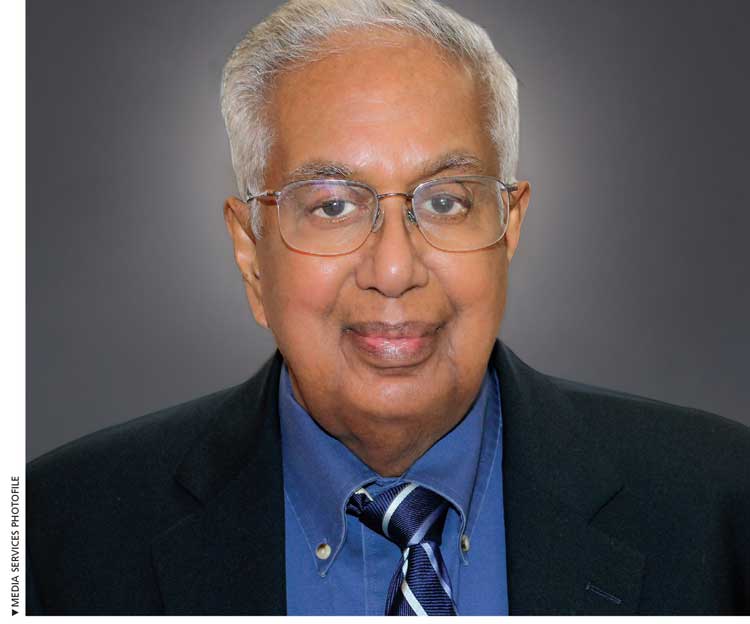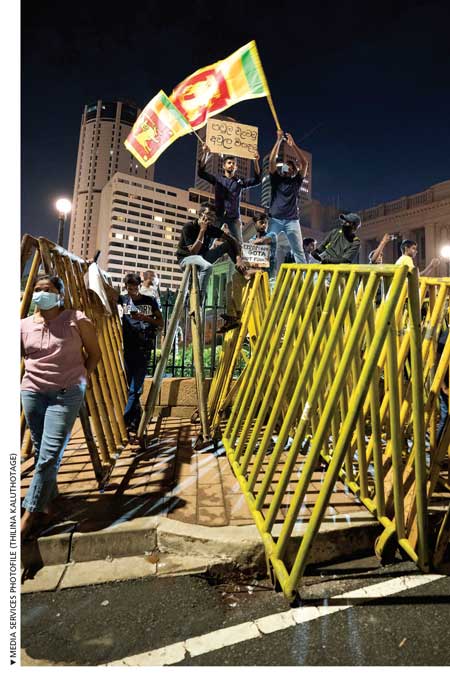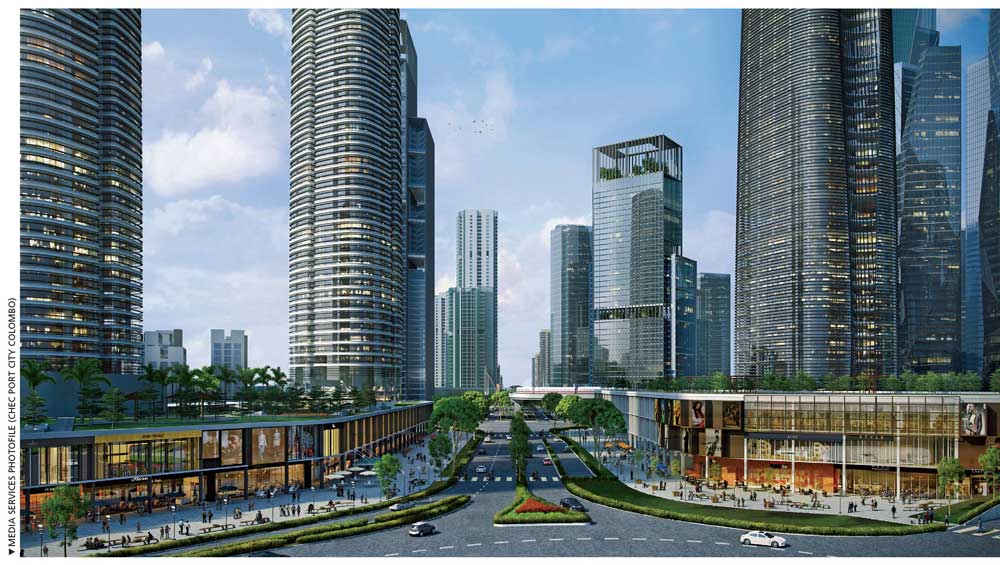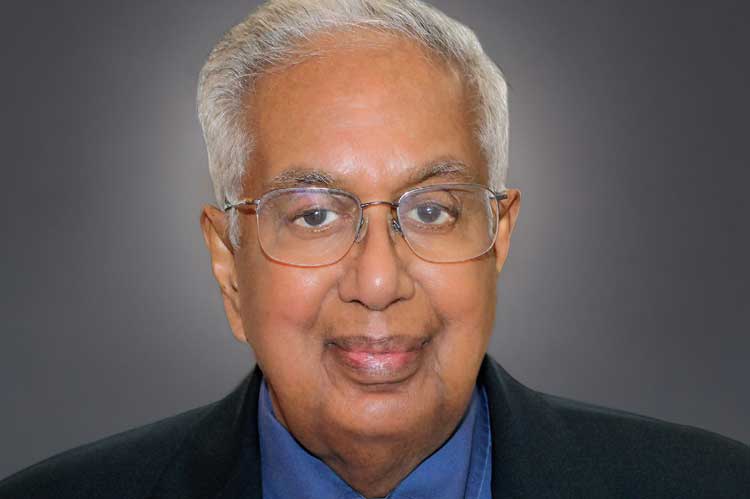
M. V. Muhsin
Sri Lanka from afar
Q: How do you perceive Sri Lanka today – albeit from afar?
A: I can do no better than cite a quote from Charles Dickens’ A Tale of Two Cities as I consider the Ceylon we knew and Sri Lanka we know now.
His quote was as follows: “It was the best of times [1948], it was the worst of times [from 1956], it was the age of wisdom [1977], it was the age of foolishness [2020]… it was the epoch of incredulity [the mismanagement of Sri Lanka’s forex reserves and COVID-19, and the fertiliser ban in 2021], it was the season of light, it was the season of darkness [the debt default last year], it was the spring of hope [the aragalaya in 2022 and economic reform programme this year], it was the winter of despair [the political tumult].”
I find that reflecting on this path of decline and drawing lessons from our experiences is an instructive exercise.

Q: Do you think Sri Lanka can regain its composure in the aftermath of multiple crises – including the economic crisis?
A: Ours is a blessed and resilient country. It ended a 26-year ‘ethnic conflict’ but now faces the aftereffects of a self-inflicted economic rout.
We took a knockout punch and had a hard fall to hit rock bottom, breaking many bones and suffering a concussion. In retrospect, this was not a bad thing as it made us wake up from the nightmare. We realised that the party was over and the music stopped – and reality dawned.
Our gift of resilience will enable us to make the necessary tough choices and grasp the nettle. We will surely struggle through the recovery process but be able to stand on our feet again, provided there is political resolve.
Q: From afar, what advice would you offer to Sri Lankans in the context of crisis management and finding solutions to the problems they face?
A: Sri Lankans must accept structural adjustments to the economy, and the readjustment of their spending habits and handouts at every economic level.
The reform programme is a necessary bitter medicine to correct the imbalances resulting from the disastrous mismanagement of the economy and underlying corrupt practices. We need to get over the talk about the ‘Chinese debt trap’; we signed up for these long-term investments.

Similarly, we need to shrug off the recent faulty narrative of an IMF debt trap. Shunning the programme will lead to Sri Lanka being trapped without international credibility and bereft of global economic confidence.
It is our programme that’s backed by the IMF, and bilateral and multilateral donors, bankers and investors. This is not a poison pill as some make it out to be; it’s a sacrifice – an investment for the future wellbeing of our citizenry and next generation.
This is what Zambia and Ethiopia – where I worked years ago – did in the face of similar economic hardships.
We need to accept and speak up for a fundamental change to the way the country is run, who we appoint and what we spend on.
In short, we need to cut our coat according to the cloth – this is the biggest challenge we face. History has proved that we’re very averse to change; our memories are short and there is a danger that band chune will strike again!
“We need to cut our coat according to the cloth – this is the biggest challenge we face”
Q: How do Americans view Sri Lanka vis-à-vis the national crisis?
A: Many Americans who held Sri Lanka in high esteem were shocked, upset and sad about what happened following the debacle of last year. One must remember that the US is a top export market for the island.
When Sri Lanka ran out of dollars and made headlines as a ‘bankrupt country,’ well-wishers knocked on our doors and asked whether they could make donations! That reflected their sadness and affinity for a country they love.
At the same time, Americans were awestruck by the bravery of Sri Lankans at all levels (including middle and high income earners, and some with babies in their arms) who joined countless others to peacefully but sternly demand political change.
FACT FILE
FAMILY
Wife – Sithy
Daughter – Zainab
SCHOOLING
Trinity College
QUALIFICATION
Fellow member of the Chartered Institute of Accountants of Sri
Lanka (CA Sri Lanka)
PRESENT OCCUPATION
Director and strategic
management consultant
COUNTRY OF RESIDENCE
USA
CITY OF RESIDENCE
Bethesda (Maryland)
Q: As for Sri Lankans living in the United States, how did they react?
A: There was despair. They shared the pain their families experienced and are doing what they can to support them financially. Many have been dealing with requests for emigration in a hopeless and panicked situation where there are no dollars locally to pay for overseas education.
Yet, there is no country that most Sri Lankans here yearn to visit or settle in more than beautiful Sri Lanka.
CV IN A NUTSHELL
Mohamed Muhsin serves as a director on global corporate and foundation boards. He is a former vice president and chief information officer (CIO) of the World Bank.
Muhsin’s accomplishments with the World Bank have been featured in a Harvard Business School case study focussing on his efforts to enable business strategies with IT.
Prior to serving the World Bank, he was an advisor on state enterprise reform to the office of then President of Zambia Kenneth Kaunda and group financial director of Zambia Industrial and Mining Corporation (ZIMCO), a state owned holding company with over 100 enterprises.
In Sri Lanka, Muhsin was a director of John Keells Holdings (JKH) as well as Dialog Axiata for 16 years.
Presently, he is a director of Pathfinder-Centennial and the Chairman of the Islamic Community Center of Potomac in Maryland (US).
Muhsin is an alumnus of Trinity College – where he was a Ryde Gold Medalist for being the best all-round student – and a fellow member of the Institute of Chartered Accountants of Sri Lanka (CA Sri Lanka). He was featured on the cover of LMD’s May 2000 edition.
Q: As far as Sri Lanka is concerned, how do you view the brain drain?
A: As hard as this may be to stomach, the brain drain is a backhanded compliment to the professional talent and skills, and extraordinary human resources that Sri Lanka possesses.
Sri Lankans are well-regarded in the US and Middle East (where I consult) for their skills, commitment and cultured approach. We need to leverage this as another source of foreign exchange.
Based on the feedback I’ve received, good people are not recognised and given responsibility, which leads to many leaving the country. Our transformation into a meritocracy is vital as this is the fundamental problem in the nation and root cause of many of our problems.
SRI LANKA SWOT ANALYSIS
STRENGTHS
One of the highest literacy rates in South Asia
Tourist haven
Very fertile country
WEAKNESSES
Hangover from corrupt and dynastical political leadership
Macroeconomic instability
OPPORTUNITIES
Revitalisation of the tourism industry and services sector
SME promotion
Reinvigoration of the Port City (to develop a global financial hub with incentives)
Globalise services sector
THREATS
Political interference
Continued corruption in the political arena
Bloated public sector and defence forces
Q: Considering the longer term, what should Sri Lanka focus on as priorities?
A: Firstly, stabilisation is key as is transformation of the public sector and divesting of state enterprises, to bring about efficiency and effectiveness. The business of government is not to manage businesses! Leave it to the private sector and incentivise SMEs.
Investments in education and technology are also vital for the country’s future. Efforts must be made to capitalise on and reinvigorate the tourism industry, which has massive potential.
Moreover, incentivise the farming and plantation sectors, small and medium industries, and renewable energy projects – multilateral agencies will be more than willing to support such programmes.
I’ll conclude as I began with A Tales of Two Cities, ending as Dickens did to tell the president that he must have courage and leave behind a lasting legacy – for “it is a far, far better thing that I do, than I have ever done; it is a far, far better rest that I go to than I have ever known.”
IMPRESSIONS OF SRI LANKA
A: I have visited the county many times over the past 10 years with the most recent being last year. The improvements in tourism, use of mobile telecommunications and emerging professional talent pool are most impressive – many possess world-class talent and skills, which augurs well for the future.
At the same time, the political cesspool of incompetent politicians has eroded governance far below even mediocrity. Even though there have been some significant visible changes, many things haven’t changed – governance, corruption, a bloated and inefficient public service, and the costly defence establishment to name a few.

“My hope is that Sri Lanka will match the Singaporean model with financial and IT solutions hubs, a first-rate Port City and shipment hub, and a haven for tourists and services“

